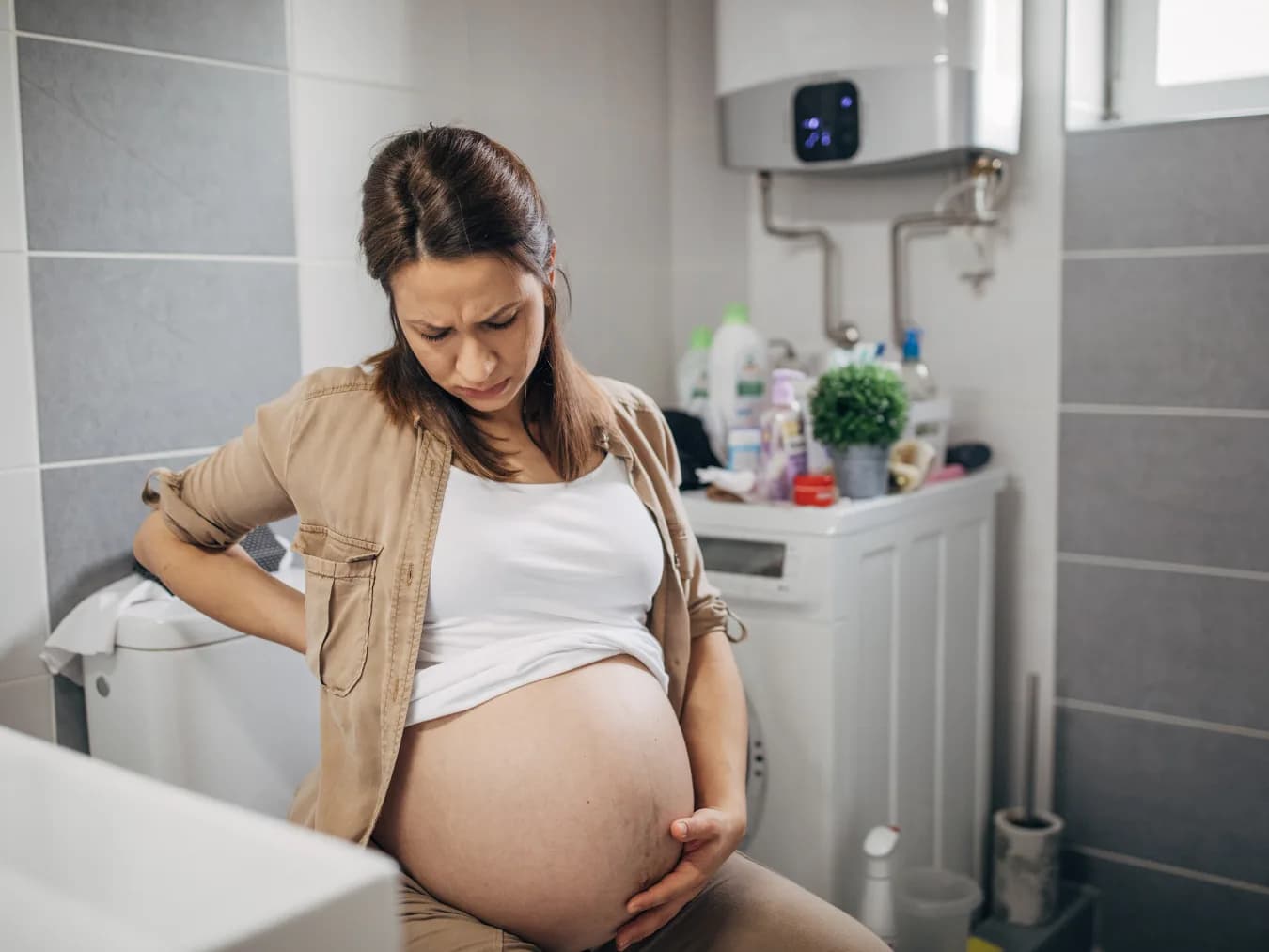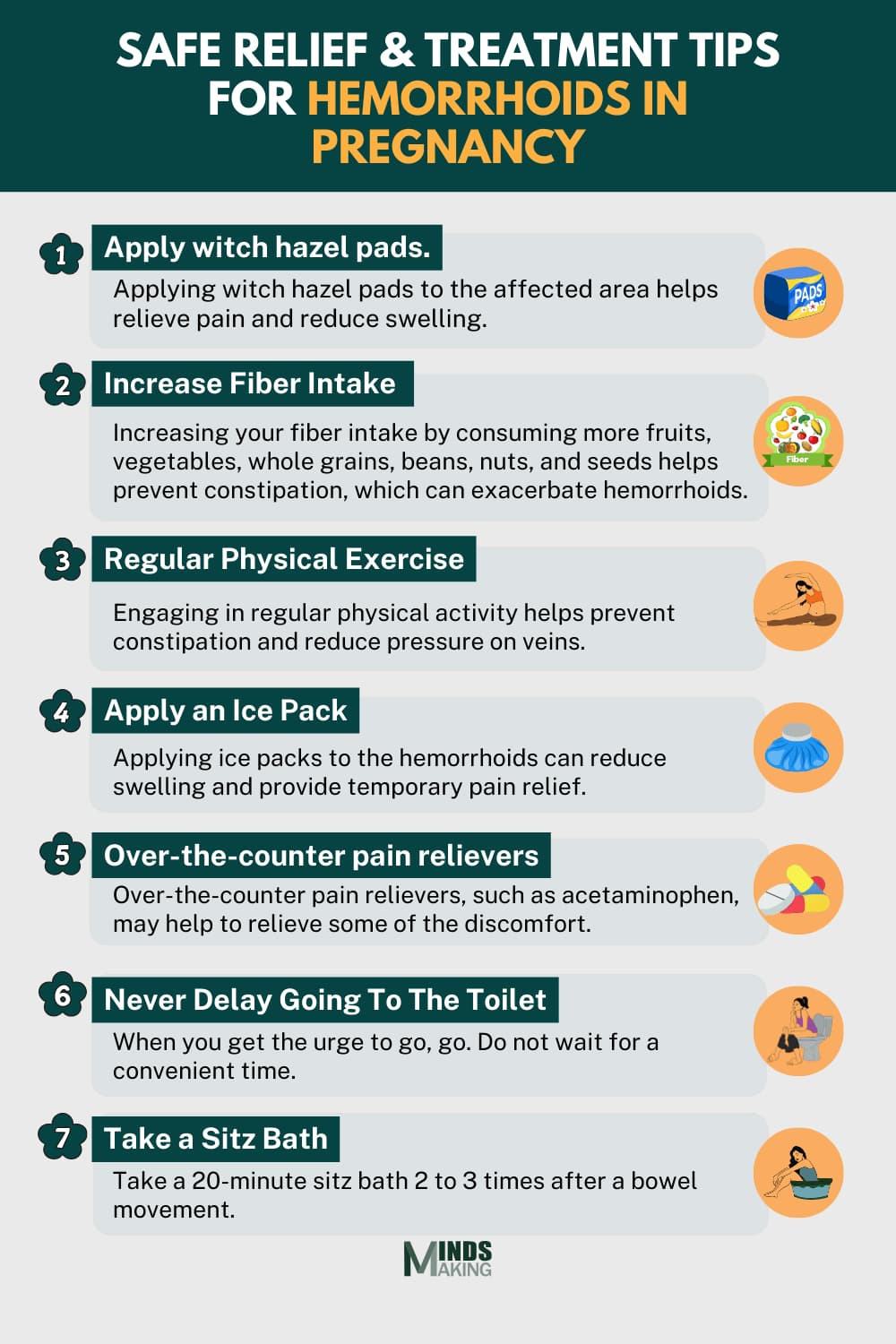Hemorrhoids During Pregnancy
getty image

Written by Mindsmaking Medical Writer
Fact Checked by Mindsmaking Professionals
2nd, June, 2025
Hemorrhoids during pregnancy can be painful and frustrating, but they are also manageable. Get insights into what causes them, the symptoms to watch out for, and the best ways to treat and prevent them safely.
Hemorrhoids during pregnancy are a common yet uncomfortable condition that many expectant mothers experience. These swollen veins in the rectal area can cause itching, discomfort, pain, and even rectal bleeding.
Hemorrhoids can occur most especially in the third trimester(8). This is due to the physical and hormonal changes your body undergoes. As your baby grows, the increased weight puts pressure on your pelvic veins, slowing blood circulation and leading to swelling.
There are ways to prevent and relieve hemorrhoids safely. Small lifestyle changes can also make a huge difference.
Key Takeaways
Hemorrhoids can occur most especially in the third trimester.
There are two types of hemorrhoids: internal hemorrhoids, which form inside the rectum and might cause painless bleeding, and external hemorrhoids, which develop around the anus and can feel sore, itchy, or swollen.
Hemorrhoids develop due to increased blood flow and pressure in the pelvic veins, pregnancy-related constipation, and hormonal changes, particularly higher progesterone levels.
Symptoms of hemorrhoids include; rectal bleeding, pain or discomfort during bowel movement or sitting, itching and irritation around the anal region, bump near the anal region and a sticky mucus-like discharge.
Simple remedies like eating fiber-rich foods, staying hydrated, using witch hazel pads, applying ice packs, and exercising can help with hemorrhoids. In severe cases, medical treatments like rubber band ligation or surgery may be necessary.
Other rectal conditions like anal fissures and colorectal issues can mimic hemorrhoid symptoms, doctors may perform physical exams, digital rectal exams, or anoscopy for accurate diagnosis.
The American College of Obstetricians and Gynecologists (ACOG) recommends that expecting mothers drink 8 to 12 cups (64 to 96 ounces) of water every day to maintain optimal hydration, which could prevent hemorrhoids.
What Are Hemorrhoids During Pregnancy?
Hemorrhoids are swollen veins in or around the rectum that can cause pain, itching, or bleeding. There are two types: internal hemorrhoids, which form inside the rectum and might cause painless bleeding, and external hemorrhoids, which develop around the anus and can feel sore, itchy, or swollen especially if a blood clot forms. (8)
During pregnancy, hemorrhoids tend to occur more often and feel more intense. While anyone can get hemorrhoids from activities like sitting too long or lifting heavy items, pregnancy-related hemorrhoids are mostly linked to the unique changes happening in your body during pregnancy, making them more common, but also temporary.
Hormonal changes, especially higher progesterone levels, relax the blood vessel walls around your rectum, making them more prone to inflammation. Pregnancy-related constipation and straining add extra stress to the rectal veins, increasing the risk of hemorrhoids.
The good news? Pregnancy hemorrhoids usually ease up after childbirth. And with a few simple changes like tweaking your diet or daily habits, they can be managed gently and safely.
What Causes Hemorrhoids during Pregnancy?
Samantha, a registered nurse who specializes in mother and baby care in the postpartum NICU, as well as antepartum and labor and delivery, shares that hemorrhoids can affect anyone at any point during pregnancy.
This is largely because of the increased blood flow to the pelvic area that supports the pregnancy, along with factors like constipation and hormonal shifts, especially the increase in progesterone, which helps relax the walls of blood vessels.
Various physical and hormonal changes that happen during pregnancy can lead to the development of hemorrhoids. (8)
Increased Pressure on Pelvic Veins: As your baby grows, it takes up more space and puts pressure on the veins in your lower body. This slows blood flow and makes the veins swell.
Constipation: During pregnancy, digestion can slow down due to hormonal changes and iron supplements, often resulting in constipation. If you find yourself straining too much in the bathroom, it can put even more pressure on those veins, potentially causing or worsening hemorrhoids.
Hormonal Changes: Progesterone, which increases during pregnancy, relaxes smooth muscles, including those in your blood vessels, making them more prone to swelling. It also slows intestinal movement, contributing further to constipation.
Increased Blood Volume: During pregnancy, your blood volume can rise by as much as 50%(7). This increase can put additional strain on the veins, especially in the lower body, where blood flow is twice and the pressure from the uterus.
What are the Symptoms of Hemorrhoids in Pregnancy?
Dr. Vani Vijay, a general laparoscopic surgeon and a proctology specialist at Apollo Spectra Hospitals, explains that hemorrhoids are quite common during pregnancy. This often happens due to the multivitamins and iron supplements that expectant mothers need to take for the healthy growth and development of their baby. Unfortunately, this combination can lead to constipation, which majorly contributes to hemorrhoids.
Hemorrhoids, which are swollen veins in the rectum, can present with various symptoms during pregnancy. (8)
- One common symptom is rectal bleeding, where you might notice blood on toilet paper or in your stool after a bowel movement. This can be scary, but rectal bleeding from an internal hemorrhoid is usually harmless.
- Pain or discomfort during bowel movements or while sitting is another sign that you might have hemorrhoids.
- Itching and irritation around the anal region, which many people with hemorrhoids find to be frustrating.
- Sometimes you may feel a small, swollen bump near your anus which can be tender and painful to touch.
- A sticky or mucous-like discharge may be present, causing additional irritation.
If you experience any of these symptoms, speak with your doctor immediately for personalized care. This is because managing hemorrhoids early can prevent further discomfort and ensure you have a smoother pregnancy journey.
How to Treat Hemorrhoids During Pregnancy
According to the American College of Obstetricians and Gynecologists, eating a high-fiber diet, drinking plenty of water helps with constipation which is among the leading causes of hemorrhoids. Doctors usually have a recommended weight gain limit, so keeping your weight gain within that recommended limit also helps. (3)
Other than these, there are home and over the counter remedies you can use in the treatment of hemorrhoids. They include:
- Applying witch hazel pads to the affected area helps relieve the pain and reduce swelling.
- Increasing your fiber intake by consuming more fruits, vegetables, whole grains, beans, nuts, and seeds can help prevent constipation, which can exacerbate hemorrhoids.
- Engaging in regular physical activity. It helps prevent constipation and reduces pressure on veins.
- Applying ice packs to the hemorrhoids also reduces swelling and provides temporary pain relief.
- Over-the-counter pain relievers, such as acetaminophen, may help relieve some discomfort.
- Do not delay going to the toilet. When you get the urge to go, go. Do not wait for a convenient time, as this can actually cause the stool to come back up, making it harder to pass, leading to increased pressure and more strain.
- After a bowel movement, take a 20-minute warm water sitz bath focusing on your buttocks and hips two to three times. This can help ease pain and soothe irritation. When you’re finished, avoid rubbing the area; instead, gently pat it dry with toilet paper or use a hair dryer on a cool setting.
If all these did little or nothing to provide enough relief for you, medical interventions such as rubber band ligation, sclerotherapy, and surgery will be recommended.
Read This Next
No posts available
mindsmaking

How Doctors Diagnose Hemorrhoids
Several other rectal conditions can mimic the symptoms of hemorrhoids. Anal Fissures, perianal abscesses, anal Fistulas, rectal prolapse, anal and colorectal cancers also present with symptoms like bleeding and discomfort, similar to hemorrhoids. This is why getting an accurate diagnosis is so important. It is not just for you to know, but also to get the right treatment. (5)
Because all these symptoms can overlap with those of hemorrhoids, it is important that when you present with any of the symptoms, you go to the doctor for evaluation.
The diagnosis of hemorrhoids is not complicated. The doctor will require your medical history and some physical exams.
Your doctor will start by asking about your symptoms, eating habits, bowel movement patterns, and any other related health conditions. A physical examination will follow, including a visual inspection of the anal area to detect external hemorrhoids, skin tags, or irritation.
For internal hemorrhoids, a digital rectal exam may be performed where a gloved, lubricated finger will be inserted gently into the rectum to assess your muscle tone and feel for any abnormalities. An anoscopy might also be done using a small tubular device to view the inside of the anus and lower rectum.
In some cases, additional procedures may be suggested to rule out other causes of rectal bleeding.
How to Prevent Hemorrhoids During Pregnancy
Knowing how to prevent hemorrhoids during pregnancy is really important for your comfort and overall well-being. According to the National Health Service, hemorrhoids can be caused by constipation. Consider keeping your stool soft and regular by eating plenty of foods that are high in fiber.
By making some simple lifestyle and dietary changes, you can lower your chances of developing hemorrhoids while pregnant. (8)
Keep Your Diet High in Fiber: Eating a fiber-rich diet is one of the best ways to avoid constipation and reduce your chances of having hemorrhoids. Choose fruits like apples and berries, vegetables like broccoli and Brussels sprouts, and whole grains such as oatmeal and brown rice. Also, add beans, lentils, nuts, and seeds to your meals whenever you can. (10)
Stay Hydrated: Drinking enough fluids is important for preventing constipation. The American College of Obstetricians and Gynecologists (ACOG) recommends that expecting mothers drink up to 8 to 12 cups (64 to 96 ounces) of water every day to maintain optimal hydration. Staying hydrated helps keep your stools soft and makes them easier to pass.(1)
Regular Exercise: Regular physical activity can really help with bowel function and reduce pressure on your veins. The World Health Organization (WHO) suggests activities like walking, swimming, and prenatal yoga. (6)
Avoid Prolonged Sitting or Standing: Spending too much time sitting or standing can put extra pressure on your rectal veins. If your day involves a lot of sitting, make sure to take short breaks to move around. When you’re resting, try lying on your side to relieve some of that pressure.
Practice Healthy Bowel Habits: When you feel the urge to go, don’t wait too long to respond. This can help prevent constipation. Avoid straining during bowel movements, as this can lead to hemorrhoids.
Frequently Asked Questions
Do hemorrhoids go away after pregnancy?
Hemorrhoids developed during pregnancy usually get worse right after delivery, then slowly get better during the postpartum period
Can hemorrhoids harm my baby?
Hemorrhoids during pregnancy do not directly affect your baby. However, if you are feeling concerned, you should contact your doctor.
How long do hemorrhoids last during pregnancy?
Hemorrhoids developed during pregnancy often clear up within a few weeks after giving birth. However, for some women, they might stick around a bit longer, and how long they last can really depend on how severe they are and other personal factors.
Can I push during labor if I have hemorrhoids?
Having hemorrhoids does not stop you from pushing during labor, but it tends to worsen it.
Was this article helpful?
How many stars are you giving this article?
Leave a comment
Your email address will not be published.









































